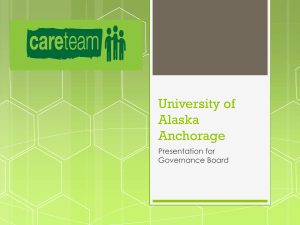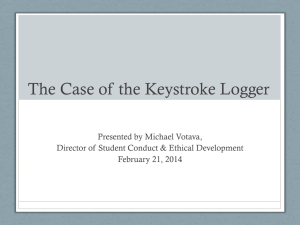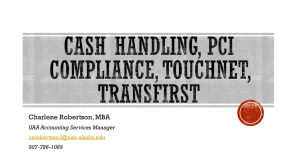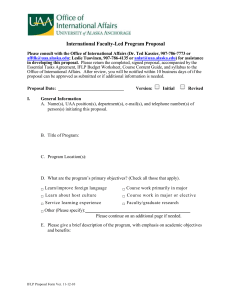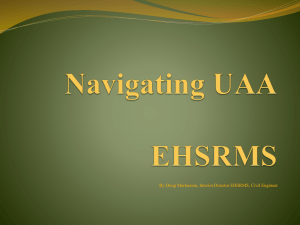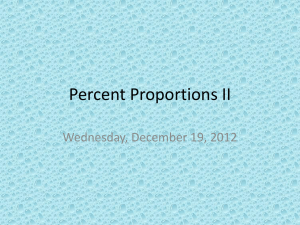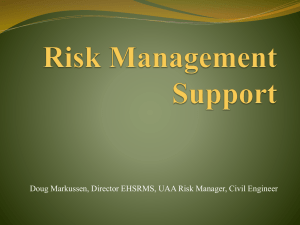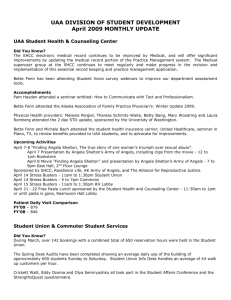COE Syllabus Template - University of Alaska Anchorage
advertisement
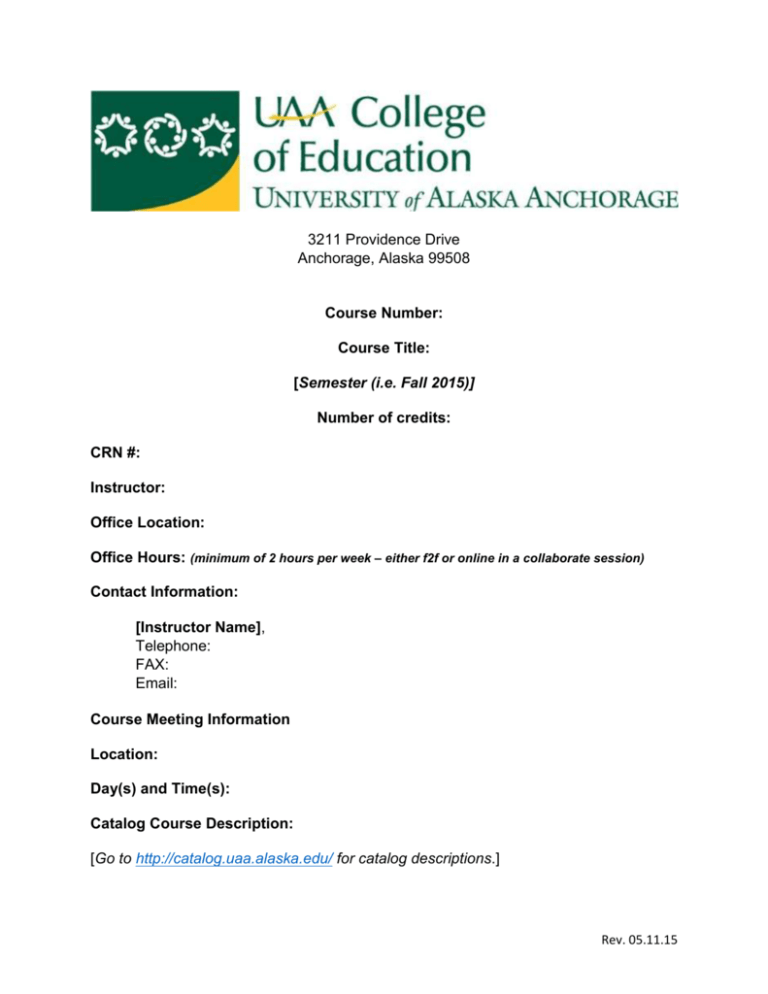
3211 Providence Drive Anchorage, Alaska 99508 Course Number: Course Title: [Semester (i.e. Fall 2015)] Number of credits: CRN #: Instructor: Office Location: Office Hours: (minimum of 2 hours per week – either f2f or online in a collaborate session) Contact Information: [Instructor Name], Telephone: FAX: Email: Course Meeting Information Location: Day(s) and Time(s): Catalog Course Description: [Go to http://catalog.uaa.alaska.edu/ for catalog descriptions.] Rev. 05.11.15 Course Prerequisite/Co-requisites: [Text that appears in Italics is suggested and may be modified at the faculty member’s discretion. Not required to keep final text in Italics format. Delete this line from final Syllabus] Course Design: Sample: Course X has weekly class sessions conducted in Blackboard Collaborate, uses Blackboard as a Learning Management System, and has required X hour field experience which will be met through video observations. This course requires additional time of student engagement to complete readings, projects, research, and other assignments. Time expectations for higher education courses are typically three hours outside of class time per week, per credit hour. Course X meets the requirements for the [Certificate, Associate of Applied Science in XXX, and Bachelor of Arts Degree in XXX, Graduate Certificate, Master of Arts in Teaching, or Master of Education degree in XXX] at the University of Alaska, Anchorage. Course Materials: Required Textbooks: Course Calendar/Schedule: This calendar and schedule is subject to change based on course and students’ needs. Detailed directions for all assignments will be available in Blackboard. Week/Date Week 1 (date) Week 2 Week 3 Week 4 Week 5 Week 6 Week 7 Week 8 Topic Assignments & Due Dates Rev. 05.11.15 Week 9 Week 10 Week 11 Week 12 Week 13 Week 14 Week 15 Week 16 Finals Week Course Assignments: Assignments Description Points Weight (If any) Due Date Grading Scale A= B= C= D= F= Student Outcomes, Assessment Procedures, Standards Addressed, and Core Values: [Copy table from CCG] This course is aligned with the following professional organizations and national and state standards: UAA College of Education Core Values and Program Outcomes http://www.uaa.alaska.edu/coe/about/coe-standards-outcomes.cfm Alaska Department of Education and Early Development Beginning Teacher Standards http://www.eed.state.ak.us/standards/pdf/beginning_teachers.pdf Alaska Department of Education and Early Development Teacher Standards http://www.eed.state.ak.us/standards/pdf/teacher.pdf Standards for Culturally Responsive Teaching https://www.eed.state.ak.us/standards/pdf/cultural_standards.pdf Rev. 05.11.15 [Insert your own program standards here.] Course Policies a. Evaluation: Successful completion of all assignments. Active participation in class discussions and other process experiences. b. Grading Policy: Students will earn a letter grade based on the cumulative points assigned to each assignment as listed above. c. Attendance Policy: Students are expected to attend all classes (including online and self-directed classes). Students are responsible for getting all class notes, handouts, and materials distributed in class. d. Make-up Policy: Make-up work will be discussed between the student and the faculty member. [Students may turn in an assignment X days/weeks late with X deduction/percentage.] e. Assignments: In addition to active class participation, students must complete the assignments listed in the syllabus. f. Withdrawal: As a faculty member, I may initiate a drop or withdrawal for students who fail to meet the course participation and assignment requirements. Check the course calendar and schedule for specific requirements and due dates. g. Auditing: Auditors are students who enroll for informational instruction only. No credit is received for audited courses. The faculty member and student agree upon terms for auditing the course. Submission of papers for correction, grading, and participation in experiences are at the discretion of the instructor. Faculty may withdraw students if they fail to comply with the agreed-upon terms. Class Cancellation and Back-up Plan Face-to-Face: Please check the UAA website during inclement weather for cancellation postings at http://www.uaa.alaska.edu/. Check Blackboard announcements and UAA email for other notifications/scheduling changes. Distance: This is a web-based course using Blackboard Collaborate and Blackboard Learn for synchronous and asynchronous interactions. If you have difficulty logging on, contact the UAA IT Call Center by telephone at (907) 786-4646 or toll free (877) 6333888 or by e-mail at callcenter@uaa.alaska.edu. Rev. 05.11.15 If Blackboard Collaborate is down at the beginning of class time, and remains down for more than 15 minutes, a Blackboard announcement and email will be sent with instructions about completing assignments. If Blackboard is not accessible for more than 48 hours, students will receive an email with directions for completing assignments. If email is not available during a Blackboard outage, students may call or Skype with questions. Communication Policies Email I may be reached by email at [insert instructor email here]. I will make every attempt to reply to your email within 24 hours on weekdays. Your email is important to me, but I get a great deal of email. To insure that I respond to your email in the timeliest manner, please follow these protocols: Put the course ID ([Insert Course ID here]), your name, and your topic in the subject line. For example: EDEL A241, John Smith, Observation Question Sign your email with your first and last name. If the course is not referenced in an email it significantly delays my ability to respond to you in a timely manner. Email is used as a primary mode of communication in this class. It is your responsibility to check your UAA email regularly for messages. At the beginning of the semester, check to be sure UAA Blackboard emails are not collecting in your junk email folder. If this does happen, open the email and select the option to mark the sender as approved/safe. Telephone I want to be accessible to you and to respond to your needs this semester. Please feel free to call or Skype and I will answer your call if I am available. If I do not answer, please leave a detailed message and I will return your call. I am unavailable to respond to phone calls during weekends and those days when the campus is closed for special holidays, vacations, or inclement weather. However, all calls and email messages will be returned during business hours on the next business day. Email is the best method of communication for receiving and sending correspondence. I also recommend accessing Blackboard for any announcements and information pertaining to this course. Blackboard Blackboard is an Internet based course management system that provides student and faculty interaction. You will use Blackboard to gain access to the course materials, assignments, and other important items related to this course. Blackboard is the tool used to obtain announcements, assignment criteria, course and class changes and Rev. 05.11.15 updates, due dates, discussion forums, etc., as outlined on the syllabus. Firefox and Chrome are the recommended browsers to access Blackboard. Free Firefox Download: https://www.mozilla.org/en-US/firefox/new/ Free Chrome Download: https://www.google.com/chrome/browser/. You can access Blackboard directly, (http://www.uaa.alaska.edu/classes/) or from the UAA website. Enter your username and password. You are now at your main Blackboard screen and will see all UAA courses for which you are registered. Select your course by clicking on it to link to class information. For technical assistance, contact UAA Call Center at 786-4646 or 1-877-633-3888. Professors control course content inside of our Blackboard courses, but we cannot correct or control Blackboard malfunctions. If Blackboard experiences major outages (more than 48 hours), please check your email for any special instructions regarding the course. Please view the materials in the Technology section of Student Help (in your Blackboard course) for more information on using Blackboard Learn. Blackboard Collaborate Blackboard Collaborate is a synchronous web meeting platform that allows for a virtual classroom to share audio, video, presentations, applications, and web tours. We will hold our class meetings in Blackboard Collaborate [Days and Time]. You will join class meetings through your Blackboard course site (Tools > Blackboard Collaborate). Please view the materials in the Technology section of Student Help (in your Blackboard course) for more information on using Blackboard Collaborate. Note that you are required to install a launcher program the first time you use Collaborate. You may view an online orientation to Blackboard Collaborate using this link: http://www.brainshark.com/blackboardinc/vu?pi=zGLzYw5XBz35Sgz0. When using Blackboard Collaborate, you are expected to show respect for yourself and your fellow students by: Listening while others are talking. Demonstrating that you heard what someone said by the reasoned response you give verbally, in chat, or through emoticons. Coming to each class session on time and fully prepared. This means that you have completed all readings and assignments and have your materials with you. Log on early enough to check your speakers and microphone (inside Collaborate, click on Tools > Audio > Audio Set-up Wizard) Working cooperatively and productively with your fellow classmates—doing an equal share of participation, discussion, and group work. Rev. 05.11.15 Turning off cell phones, removing distractions, and giving your full attention to class sessions. Do not multitask during class time. It is impossible to give your full attention to discussions if you are emailing, posting or website surfing during class time. Creating an environment of respect: Students are expected to share their ideas with others and are encouraged to explore possible sources of these perspectives (e.g., culture, education, religion, experience, personality, personal bias, etc.). Some of the opinions in this course you will agree with, others you will not. This sets the stage for some very interesting discussion, learning, and growth for all of us. It is expected that everyone treats the ideas, opinions, values, and beliefs shared during the course with the same level of respect you wish to receive when sharing your own. This also applies to the discussion board, whole group class discussions, and messaging. COLLEGE OF EDUCATION CONCEPTUAL FRAMEWORK Mission Statement The mission of the College of Education is to prepare educators and support the lifelong learning of professionals to embrace diversity and to be intellectually and ethically strong, resilient, and passionate in their work with Alaska’s learners, families, educators, and communities. Our programs emphasize the power of learning to transform people’s lives. Across the university, faculty members teach professional educators to work in diverse settings, to form and sustain learning partnerships, and to provide learning across the life span. We are confident that this preparation will result in educators’ significant contributions to society. Core Values The College of Education promotes the following core values: Intellectual Vitality; Collaborative Spirit; Inclusiveness & Equity; and Leadership Commitment to Diversity: Students enrolled in this course will develop: Knowledge regarding (a) historical and cultural traditions of Alaska’s cultural and ethnic groups, (b) the impact of socio-cultural influences on education, (c) trends in education special learning populations, (d) state and federal education legislations, and (e) culturally competent pedagogical practices. Rev. 05.11.15 Skills in using culturally sensitive and responsive instructional and assessment strategies and materials that (a) promote multiculturalism, (b) identify, analyze, and minimize bias regarding race, ethnicity, national origin, gender, low socioeconomic levels, religion, geographic regions, and sexual orientation; (c) promote academic achievement and educational equity for Alaska’s diverse students; (d) develop appropriate cross-cultural communication skills that promote positive partnerships with parents and families. Dispositions that relate to (a) realizing personal and professional growth through self-evaluation and reflection; (b) examining personal beliefs toward people from different ethnic and socioeconomic communities and genders; (c) demonstrating sensitivity toward people from diverse racial, ethnic, and cultural backgrounds; (d) appreciating cultural diversity and its applications to teaching multicultural populations; (e) understanding the impact of legislation on education processes for student with disabilities and others at risk of educational failure; and (f) recognizing the effects of family involvement of students’ achievement. Commitment to Technology: College of Education students are expected to (a) demonstrate sound understanding of technology operations and concepts; (b) plan and design effective learning environments and experiences supported by technology; (c) implement curriculum plans that include technology applications in methods and strategies to maximize student learning; (d) use technology to facilitate a variety of effective assessment and evaluation strategies; (e) use technology to enhance productivity and professional practice; and (f) understand the social, ethical, and human issues surrounding use of technology in PreK-12 schools and apply those principles in practice. COLLEGE OF EDUCATION POLICIES Criminal History Background Clearance All field experiences require background check clearance. The type of experience determines the type of background check required. Background check requirements are subject to change without notice. Additional information is available online at http://www.uaa.alaska.edu/coe/currentstudents/field-experiences/backgroundchecks.cfm. Field Experience (add information about expectation of field experience, where, time, etc.) All programs require some of the field experience for some courses to take place in the state of Alaska to support learning about the Alaska context and to meet licensure requirements. Rev. 05.11.15 Permissions The copyright law of the United States (Title 17, United States Code) governs the making of photocopies or other reproductions of copyrighted materials. Under certain conditions specified in the law, libraries and archives are authorized to furnish a photocopy or other reproduction. One of these specified conditions is that the photocopy or reproduction is not to be "used for any purpose other than private study, scholarship, or research." If a user makes a request for, or later uses, a photocopy or reproduction for purposes in excess of "fair use," that user may be liable for copyright infringement. Therefore, you should not make any reproductions of any of the content posted in the Blackboard shell. You should not distribute any of the content to any other party. The content in Blackboard is for your private study in the mastery of this subject matter. This course may not be recorded (through video, audio, or photographs) without permission of the instructor. Plagiarism Submission of work completed by someone else, or work/assignments used in another class is prohibited. A grade of “F” may be assigned in such instances. Further, plagiarism may result in action to drop the student from class. Advice on avoiding plagiarism may be obtained at http://owl.english.purdue.edu/owl/resource/589/01/. Professional and Ethical Behavior College of Education students are expected to abide by the State of Alaska Code of Ethics of the Education Profession and professional teaching standards as they concern students, the public, and the profession. The standards, adopted by the Professional Teaching Practices Commission (PTPC), govern all members of the teaching profession. A violation of the code of ethics and professional teaching standards is grounds for discipline by the PTPC. For more information, refer to http://www.eed.state.ak.us/ptpc/. Written Style Requirements The College of Education endorses the style of the American Psychological Association (APA) found in the APA Publication Manual (6th ed.). You can access information about the manual at the following website: http://www.apastyle.org or visit the campus bookstore. All written assignments should be completed using a computer. All grammar and spelling should be checked and corrected. STUDENT RESOURCES Rev. 05.11.15 Center for Research of Alaska Native Education (CRANE) The Center is dedicated to the belief that a better future for Alaska Native peoples requires a transformation of current educational systems. Alaska Native cultures, societies, organizations and peoples bring thousands of years of knowledge, insights and understandings about the lands, waters, and dynamics of Alaska. A transformation of the educational systems for Alaska Native students requires an integration of Alaska Native cultures and languages from preschool to graduate school. The Center will serve as a space where graduate students, faculty, researchers, Alaska Native leaders and all others dedicated to Alaska Native education and pedagogy can gather to imagine and shape systemic change. College of Education Student Services The UAA College of Education Student Services provides support, resources, and opportunities for students to identify and achieve their academic and certification goals. Student Services delivers accurate and friendly service to students from the first inquiry through application for professional licensure. Student Services professional staff is an integral part of the community of educators at the College of Education. Students are always welcome to stop by to see us. We guarantee a smile and friendly welcome! Hours: 7:00 AM – 5:00 PM, Monday – Friday Phone: (907)786-4401 Consortium Library The Consortium Library serves the University of Alaska Anchorage and Alaska Pacific University students, staff, and faculty, as well as members of the public. Phone: 907-786-1871 for hours and telephone calling menu. 907-786-1848 for reference service. Website: http://consortiumlibrary.org/ Disability Support Services (DSS) At the University of Alaska Anchorage, providing equal opportunities for students who experience disabilities is a campus-wide responsibility and commitment. Disability Support Services (DSS) coordinates the support services for UAA students who experience disabilities, as well as provides resources for the university and community. In addition to those support services, DSS promotes a Universal Design approach to encourage a barrier-free culture for everyone. When barriers do arise, DSS serves as a resource to assist in the identification of reasonable adjustments. Individuals are Rev. 05.11.15 encouraged to meet with DSS Staff two weeks before the accommodation is needed. Phone: (907) 786-4530 TTY: (907) 786-4536 Website: http://www.uaa.alaska.edu/dss/ Informational Technology (IT) Services The Office of the CIO and IT Services is responsible for UAA's telecommunications, network infrastructure, and academic technology support services. Phone: (907) 786-4646 Toll Free: (877) 633-3888 Email: callcenter@uaa.alaska.edu Website: http://www.uaa.alaska.edu/informationtechnologyservices/ Learning Resource Center The Learning Resources Center (LRC) functions as a Learning Commons on UAA’s west campus, housing student learning support resources and providing opportunities to all UAA students. The center features a Math Lab to help students build their math and reasoning skills and a Math Testing Center to provide proctoring services for students in preparatory math courses. The Writing Center provides English language writing and disciplinary literacy support via walk-in, appointment and email. At the Center for Language Learning, tutoring in world languages is available for American Sign Language (ASL), Chinese, French, German, Japanese, Russian and Spanish Phone: 907 786-6828 Website: http://www.uaa.alaska.edu/lrc/index.cfm UAA Care Team The mission of the UAA Care Team is to promote a safe and productive learning, living and working environment by addressing the needs of students through coordination and assessment of information and developing a supportive plan. Rev. 05.11.15 If you have any questions about whether or not to submit a report please contact UAA’s Care Team. The Care Team Coordinator can be contacted via phone or e-mail from 8:00 AM – 5:00 PM, Monday – Friday. Phone: (907) 786-1214 Email: care@uaa.alaska.edu Website: http://www.uaa.alaska.edu/careteam/. UNIVERSITY POLICIES Academic Integrity Academic integrity is a basic principle that requires that students only take credit for ideas and efforts that are their own. Cheating, plagiarism, and other forms of academic dishonesty are defined as the submission of materials in assignments, examinations, or other academic work that a student has submitted for a course may not be resubmitted for credit in another course without the knowledge and advance permission of the instructor. For more information, visit http://www.uaa.alaska.edu/deanofstudents/academic-integrity/. https://www.consortiumlibrary.org/blogs/ahi/uaa-apu-policies-and-procedures/ ADA Policy The provision of equal opportunities for students who experience disabilities is a campus-wide responsibility and commitment. UA system is committed to the goal of providing each qualified student an equal opportunity to pursue a college education regardless of disability. Efforts will be made toward meeting reasonable requests for services to students with disabilities eligible under Section 504 of the Rehabilitation Act of 1973 and the Americans with Disabilities Act (ADA). Disabilities Support Services (DSS) is the designated UAA department responsible for coordinating academic support services for students who experience disabilities. To access support services, students must contact DSS (786-4530 or 786-4536 TTY) and provide current disability documentation that supports the requested services Additional information may be accessed at the DSS Office in the Rasmuson Hall 105 or online at www.uaa.alaska.edu/dss. Incomplete Grades Rev. 05.11.15 In accordance with University policy, an incomplete grade (I) is assigned only at the discretion of the instructor. It is used to indicate that a student has made satisfactory progress in the majority of the work in a course, but for unavoidable absences or other conditions beyond the control of the student, has not been able to complete the course. For more information, refer to Chapter 7 Academic Standards and Regulations in the UAA catalog. Personal Safety Diminished mental health, including significant stress, mood changes, excessive worry, or problems with eating and/or sleeping can interfere with optimal academic performance. The source of symptoms might be strictly related to your course work; if so, please speak with your instructor. However, problems with relationships, family worries, loss, or a personal struggle or crises can also contribute to decreased academic performance. UAA provides mental health services to support the academic success of students. The Student Health and Counseling Center and the Psychological Services Center both offer low cost, confidential services to help you manage personal challenges. Treatment for mental health problems is effective. More information and resources are located at http://www.uaa.alaska.edu/ispi/. Immediate help (24/7) is available through Alaska Careline: 877-266-4357 or at www.carelinealaska.com. Religious Holiday or Cultural Observance Policy If a class meeting occurs on a religious holiday or cultural observance day and you are obligated to miss class for this event, you must notify the instructor in writing by the end of the second week of the semester. Safety on Campus Safety is a priority at UAA. All members of the academic community are encouraged to take responsibility for their own safety by taking the time to locate the nearest exits and emergency telephones when they are in campus buildings. Safety concerns may be brought to the attention of UAA faculty or staff, or the University Police at (907)786-1120 (V/TTY). For more safety information and the most recent campus crime report, visit www.uaa.alaska.edu/safety. Safety in Online Environments UAA will never send you an unsolicited email asking you for your password or other personal information. If you receive such a message, please delete it. If you have any concerns, contact the IT Call Center at (907)786-4646, menu option 1, or via email at callcenter@uaa.alaska.edu. If you experience cyber bullying, cyberstalking, or other Rev. 05.11.15 inappropriate conduct as part of your involvement in a UAA class, please notify your instructor immediately. Safety from Sexual Violence (Title IX) Members of the university community, guests and visitors have the right to be free from sexual violence. All members of the campus community are expected to conduct themselves in a manner that does not infringe upon the rights of others. UAA takes all matters of Sexual Harassment, Sexual Assault and Sexual Violence seriously. If you have concerns or need to report an incident, please contact the Director of the Office of Campus Diversity & Compliance, University Lake Building, Room 108. The contact number is (907) 786-1424. More information is available on the UAA Website at http://www.uaa.alaska.edu/deanofstudents/title-ix.cfm. Student Code of Conduct As with all members of the university community, the university requires students to conduct themselves with honesty and responsibility, and to respect the rights of others. Conduct that unreasonably interferes with the learning environment or that violates the rights of others is prohibited by the standards and guidelines collectively described as the Student Code of Conduct. For more information, refer to the UAA Fact Finder/Student Handbook at http://www.uaa.alaska.edu/deanofstudents/deanofstudentsoffice/uaafactfinder.cfm. Smoke and Tobacco-Free On November 19, 2015 UAA will implement BOR policy PO5.12.102, which will make UAA a smoke and tobacco-free campus. This policy will take effect on December 1, 2015 for Kodiak and Mat-Su Colleges, and December 31, 2015 for PWSC and KPC. University Email UAA uses email to communicate with students on many important matters. The university automatically assigns each student an official UAA email account at the time of admission to the university for certificate/degree-seeking students and at the time of registration for all other students. Students are responsible for knowing and, when appropriate, acting on the contents of all university communications sent to their official UAA email accounts. To receive university communications at a different email address, students may forward email from their assigned UAA accounts to any valid third party email address of their choice that accepts forwarded email. Contact the UAA IT Call Rev. 05.11.15 Center by telephone at (907)786-4646, Toll Free at (877)633-3888, or by email at callcenter@uaa.alaska.edu if you need assistance. Rev. 05.11.15
